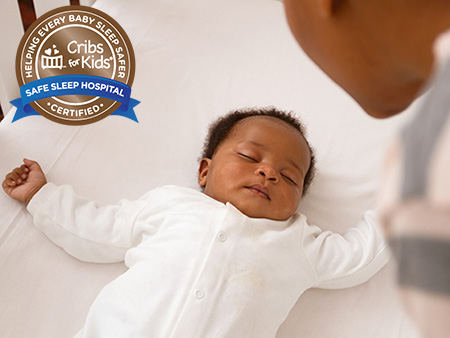 UAB’s Women & Infants Center has earned Cribs for Kids National Safe Sleep Hospital Certification designation as a Bronze Safe Sleep Hospital. The Cribs for Kids organization recognizes hospitals for their commitment to infant safe sleep. Certification indicates that the hospital models and teaches infant safe sleep best practices to prevent sleep-related deaths.
UAB’s Women & Infants Center has earned Cribs for Kids National Safe Sleep Hospital Certification designation as a Bronze Safe Sleep Hospital. The Cribs for Kids organization recognizes hospitals for their commitment to infant safe sleep. Certification indicates that the hospital models and teaches infant safe sleep best practices to prevent sleep-related deaths.
Among the criteria for certification are:
- Develop a safe sleep policy statement incorporating the American Academy of Pediatrics’ Infant Safe Sleep guidelines.
- Conduct onboarding and ongoing training of the healthcare team members according to the hospital’s Infant Safe Sleep Policy.
- Educate parents, caregivers and guardians of children 1 year old or less on the importance of safe sleep practices, and implement these practices in the hospital setting.
- Work in conjunction with appropriate departments within the hospital system to ensure images depicting unsafe infant sleep or sleep environments are not used in social media, marketing campaigns or on site artwork/photos.
Launched in 2015, Cribs for Kids National Safe Sleep Hospital Certification program recognizes individual hospitals and hospital systems for their commitment to infant safe sleep.
Sudden unexpected infant death is a term used to describe the sudden and unexpected death of a baby less than 1 year old in which the cause was not obvious before investigation. These deaths often happen during sleep or in the baby’s sleep area.
About 3,600 babies in the United States die suddenly and unexpectedly each year. In 2018, there were about 1,300 deaths due to Sudden Infant Death Syndrome, about 1,300 deaths due to unknown causes, and about 800 deaths due to accidental suffocation and strangulation in bed.
Alabama, Arkansas, Mississippi, Alaska and Louisiana have the highest SUID rates, between 152 and 178 per 100,000 live births, according to the Centers for Disease Control and Prevention.
